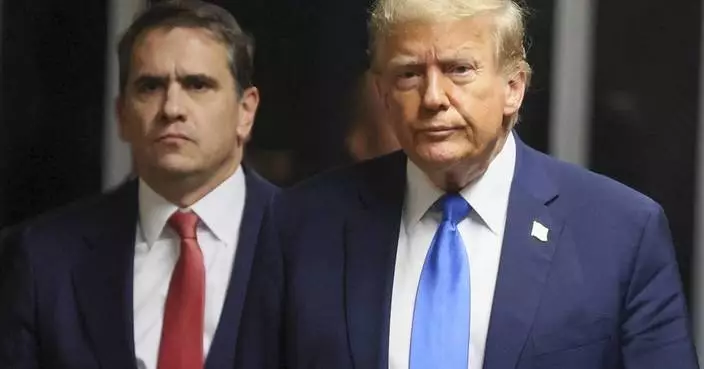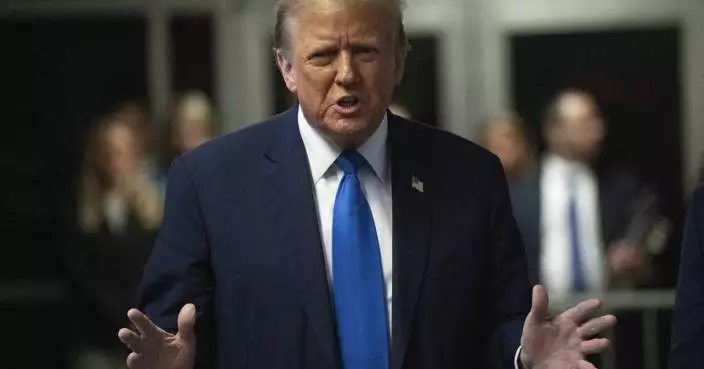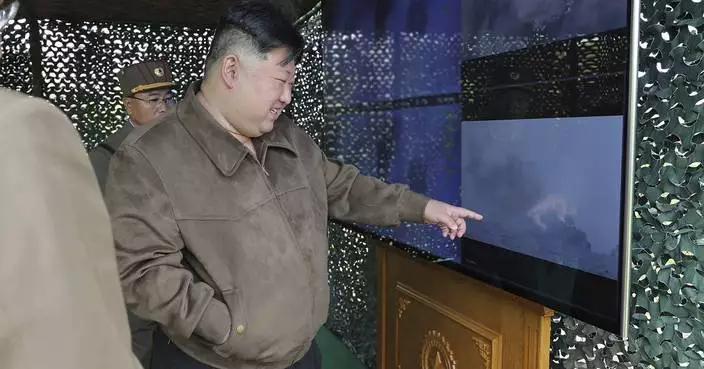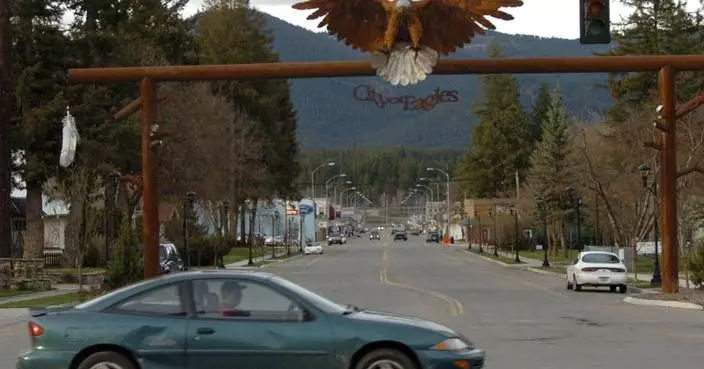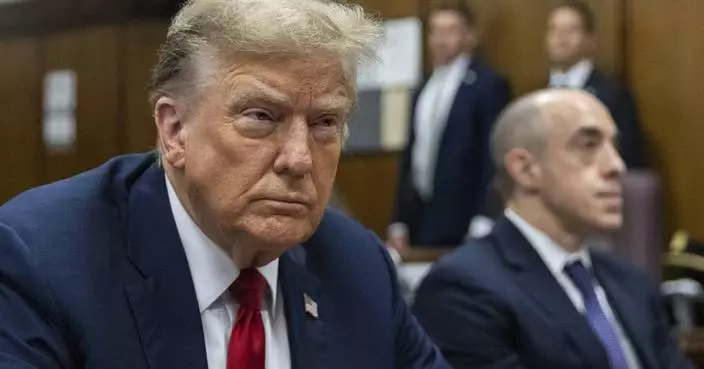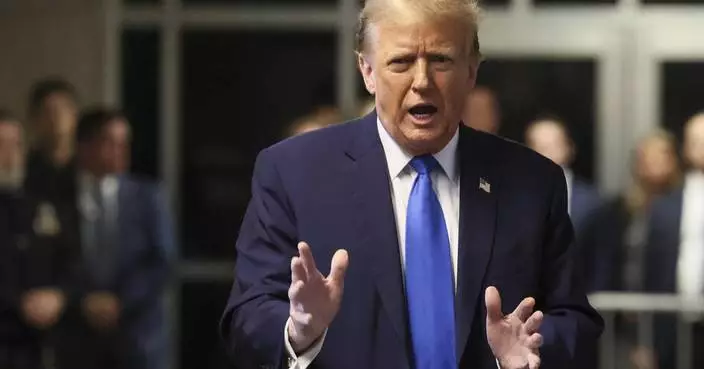North Korea said Friday that it's still willing to sit for talks with the United States "at any time, (in) any format," a remarkably restrained and diplomatic response, from a nation noted for its proud belligerence, to U.S. President Donald Trump's abrupt cancellation of a summit with the North's autocratic leader, Kim Jong Un.
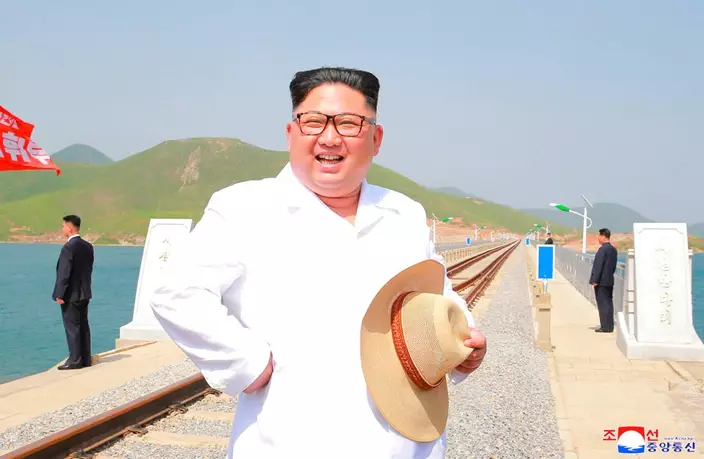
In this undated photo provided on Friday, May 25, 2018, by the North Korean government, North Korean leader Kim Jong Un inspects the completed Koam-Tapchon Railways in Gangwon-do, North Korea. Independent journalists were not given access to cover the event depicted in this image distributed by the North Korean government. The content of this image is as provided and cannot be independently verified. Korean language watermark on image as provided by source reads: "KCNA" which is the abbreviation for Korean Central News Agency. (Korean Central News Agency/Korea News Service via AP)
The statement by Vice Foreign Minister Kim Kye Gwan, a longtime nuclear negotiator and senior diplomat, which said the North is "willing to give the U.S. time and opportunities" to reconsider talks that had been set for June 12 in Singapore, could be driven by a need to use the summit to ease crushing international sanctions, or by a determination that a summit with the mercurial Trump is the best opportunity the North will ever have to elevate itself, and its nuclear program, to equality with its archrival. One analyst marveled that the North Korean response was "close to an apology letter."
Click to Gallery
North Korea said Friday that it's still willing to sit for talks with the United States "at any time, (in) any format," a remarkably restrained and diplomatic response, from a nation noted for its proud belligerence, to U.S. President Donald Trump's abrupt cancellation of a summit with the North's autocratic leader, Kim Jong Un.
The statement by Vice Foreign Minister Kim Kye Gwan, a longtime nuclear negotiator and senior diplomat, which said the North is "willing to give the U.S. time and opportunities" to reconsider talks that had been set for June 12 in Singapore, could be driven by a need to use the summit to ease crushing international sanctions, or by a determination that a summit with the mercurial Trump is the best opportunity the North will ever have to elevate itself, and its nuclear program, to equality with its archrival. One analyst marveled that the North Korean response was "close to an apology letter."
Earlier comments by South Korean President Moon Jae-in, seen as a driving force behind the summit and just returned to Seoul from a meeting with Trump in Washington, suggested that the South, a top U.S. ally and host to 28,500 U.S. troops, was blindsided by Trump's statement. Moon said he was "perplexed" at Trump's announcement that he was canceling the summit because of what the U.S. president said was North Korea's "tremendous anger and open hostility." Moon urged direct talks between Trump and Kim to get things back on track.
Kim Dong-yub, a North Korea expert at Seoul's Institute for Far Eastern Studies, said the North Korean response was notably "courteous, reserved and diplomatically refined," which he said shows that Pyongyang is eager to talk with Washington and believes that the United States needs more time to prepare for the summit.
In his statement to the North, Trump said: "If you change your mind having to do with this most important summit, please do not hesitate to call me or write."
Protesters with a portrait of U.S. President Donald Trump stage a rally against the United States' policies near the U.S. embassy in Seoul, South Korea, Friday, May 25, 2018. North Korea said Friday that it's still willing to sit down for talks with the United States "at any time, at any format" just hours after President Donald Trump abruptly canceled his planned summit with the North's leader Kim Jong Un. (AP Photo/Ahn Young-joon)
Regardless of the motivation, Kim Kye Gwan's statement is the latest whiplash development in efforts to diplomatically address what might be the world's most dangerous standoff. Focus will now swing back to how Trump will respond to the North's seemingly conciliatory gesture.
The stakes are high. A scrapping of diplomacy could see a return to the torrent of weapons tests — and the fears of war they created — that North Korea unleashed last year as it sought to put the finishing touches on a nuclear-armed missile program meant to target the entire U.S. mainland. Since January, Kim has taken a radically softer approach to foreign affairs, sending his sister to the Olympics in South Korea, meeting with his South Korean counterpart on their shared border and exploding parts of his nuclear testing site Thursday in an apparent sign of good faith. The Singapore summit would have been the culmination of this outreach.
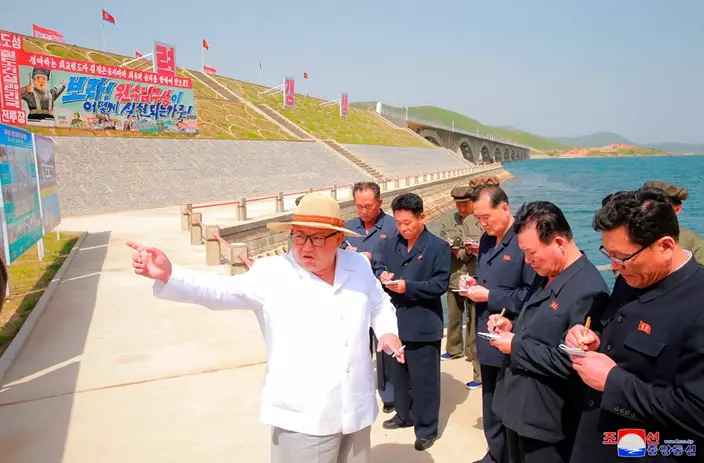
In this undated photo provided on Friday, May 25, 2018, by the North Korean government, North Korean leader Kim Jong Un inspects the completed Koam-Tapchon Railways in Gangwon-do, North Korea. Independent journalists were not given access to cover the event depicted in this image distributed by the North Korean government. The content of this image is as provided and cannot be independently verified. Korean language watermark on image as provided by source reads: "KCNA" which is the abbreviation for Korean Central News Agency. (Korean Central News Agency/Korea News Service via AP)
Earlier comments by South Korean President Moon Jae-in, seen as a driving force behind the summit and just returned to Seoul from a meeting with Trump in Washington, suggested that the South, a top U.S. ally and host to 28,500 U.S. troops, was blindsided by Trump's statement. Moon said he was "perplexed" at Trump's announcement that he was canceling the summit because of what the U.S. president said was North Korea's "tremendous anger and open hostility." Moon urged direct talks between Trump and Kim to get things back on track.
Many observers had expected a belligerent North Korean response to Trump's cancellation, but the comments by Kim, the North's vice foreign minister, seemed, at times, almost meek, and in stark contrast to the bellicose declarations last year of the North's willingness to pursue nuclear war.
Kim said Pyongyang's "objective and resolve to do our best for the sake of peace and stability of the Korean Peninsula and all humankind remain unchanged." Kim said the cancellation of the talks shows "how grave the status of historically deep-rooted hostile North Korea-U.S. relations is and how urgently a summit should be realized to improve ties."
"As far as the historic (North Korea)-U.S. summit is concerned, we have inwardly highly appreciated President Trump for having made the bold decision, which any other U.S. presidents dared not, and made efforts for such a crucial event as the summit," Kim said. "His sudden and unilateral announcement to cancel the summit is something unexpected to us and we cannot but feel great regret for it."
Kim speculated that Trump may have "lacked the will for the summit or he might not have felt confident," but that the North has "exerted sincere efforts" for talks that "would mark a meaningful starting point for peace and security in the region and the world."
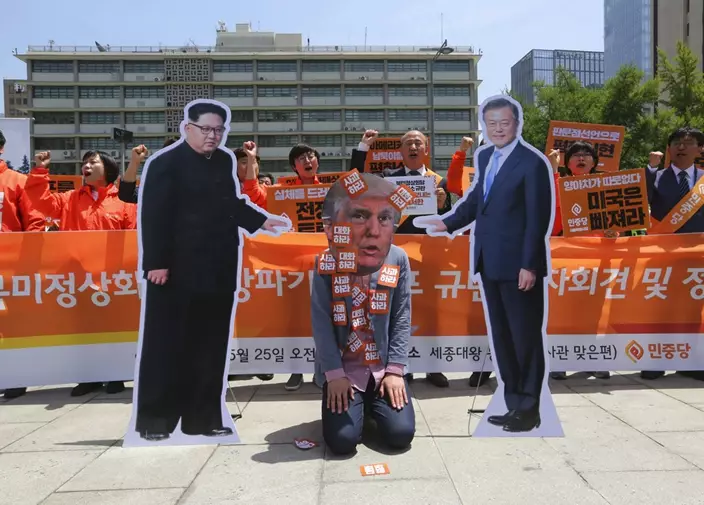
A protester wearing a mask of U.S. President Donald Trump, center, performs with cut-out photos of North Korean leader Kim Jong Un and South Korean President Moon Jae-in, right, during a rally against the United States' policies against North Korea near the U.S. embassy in Seoul, South Korea, Friday May, 25, 2018. North Korea said Friday that it's still willing to sit down for talks with the United States "at any time, at any format" just hours after President Donald Trump abruptly canceled his planned summit with the North's leader Kim Jong Un. The signs read " Apology." (AP Photo/Ahn Young-joon)
Kim Dong-yub, a North Korea expert at Seoul's Institute for Far Eastern Studies, said the North Korean response was notably "courteous, reserved and diplomatically refined," which he said shows that Pyongyang is eager to talk with Washington and believes that the United States needs more time to prepare for the summit.
Trump's cancellation of the summit came amid mounting skepticism about the North's sincerity after the country's earlier threats to scrap the Kim-Trump summit. That may have been aimed at bolstering its negotiating position, rather than killing the meeting.
"They wanted to face the United States in a more confident position. Obama or (Bill) Clinton could have accepted (these kinds of North Korean statements). But it's Trump. He's decided not to enter talks while being pushed (by North Korea) like this," said Choi Kang, vice president of Seoul's Asan Institute for Policy Studies.
Koh Yu-hwan, a professor at Seoul's Dongguk University, said Kim's statement was "close to an apology letter."
The North might have also sensed an opening in Trump's seemingly mixed messages.
"I really believe Kim Jong Un wants to do what's right," the U.S. president said at one point. Trump also said from the White House that a "maximum pressure campaign" of economic sanctions and diplomatic isolation would continue against North Korea — with which the U.S. is technically still at war — but he added that it was possible the summit could still take place at some point.
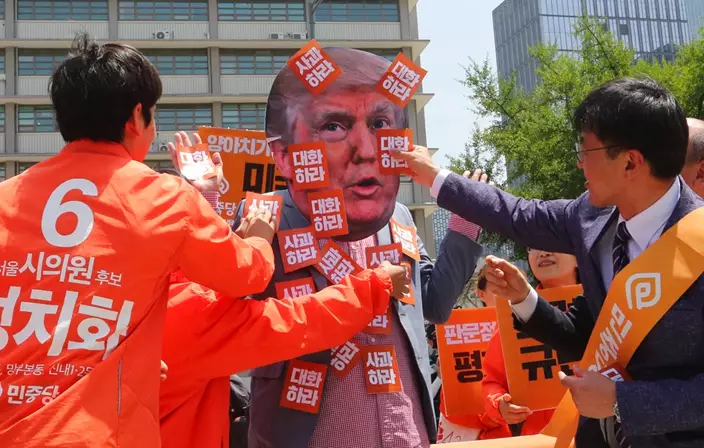
Protesters attach stickers at their fellow protester wearing a mask of U.S. President Donald Trump during a rally against the United States' policies against North Korea near the U.S. Embassy in Seoul, South Korea, Friday May 25, 2018. North Korea said Friday that it's still willing to sit down for talks with the United States "at any time, at any format" just hours after President Donald Trump abruptly canceled his planned summit with the North's leader Kim Jong Un. The signs read " Apology." (AP Photo/Ahn Young-joon)
In his statement to the North, Trump said: "If you change your mind having to do with this most important summit, please do not hesitate to call me or write."
It was unclear whether Trump was engaged in what he saw as a negotiating ploy or if his moves were a manifestation of mounting internal concerns over ensuring a successful outcome for the summit.
While the statement may keep the possibility of a summit alive, there were also hints in North Korea's response to Trump that Pyongyang was willing to walk away.
Kim said the United States is at fault for what Trump described as North Korea's "hostility," saying that Pyongyang was responding to "excessive" U.S. comments pressuring the country to "unilaterally discard" its nuclear weapons ahead of the summit. Trump's move to cancel the summit has forced the North to "rethink whether the efforts we have so far put in and the new path we have taken is the right choice."
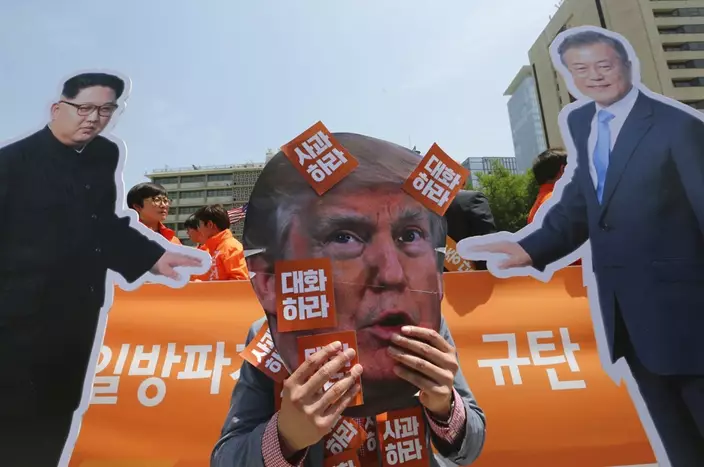
A protester wearing a mask of U.S. President Donald Trump, center, performs with cut-out photos of North Korean leader Kim Jong Un and South Korean President Moon Jae-in, right, during a rally against the United States' policies against North Korea near the U.S. embassy in Seoul, South Korea, Friday, May 25, 2018. North Korea said Friday that it's still willing to sit down for talks with the United States "at any time, at any format" just hours after President Donald Trump abruptly canceled his planned summit with the North's leader Kim Jong Un. The signs read " Apology." (AP Photo/Ahn Young-joon)
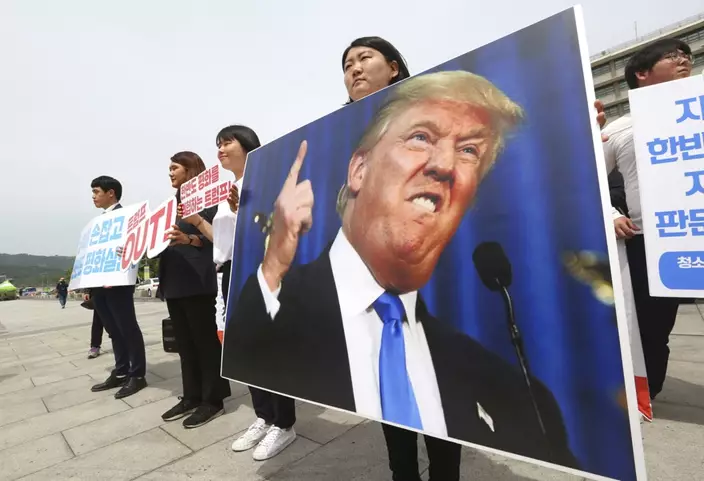
Protesters with a portrait of U.S. President Donald Trump stage a rally against the United States' policies near the U.S. embassy in Seoul, South Korea, Friday, May 25, 2018. North Korea said Friday that it's still willing to sit down for talks with the United States "at any time, at any format" just hours after President Donald Trump abruptly canceled his planned summit with the North's leader Kim Jong Un. (AP Photo/Ahn Young-joon)
WASHINGTON (AP) — Former President Donald Trump faces serious charges in two separate cases over whether he attempted to subvert the Constitution by overturning the results of a fair election and illegally remain in power.
Yet it’s a New York case centered on payments to silence an adult film actress that might provide the only legal reckoning this year on whether he tried to undermine a pillar of American democracy.
Trump is charged in the so-called hush money case with trying to falsify business records, but it was hard to tell that as the trial opened Monday.
Lead prosecutor Matthew Colangelo wasted little time during opening statements tying the case to Trump's campaigning during his first run for the presidency. He said the payments made to Stormy Daniels amounted to "a criminal scheme to corrupt the 2016 presidential election."
Whether the jury accepts that connection will be pivotal for Trump's fate. The presumptive nominee faces charges related to falsifying business records that would typically be misdemeanors unless the alleged act could be tied to another crime. Prosecutors were able to charge them as felonies because they allege that the false records were part of an effort to cover up state and federal election law violations — though that’s still not the type of direct election interference that Trump is charged with elsewhere.
Trump himself has referred to the New York trial and the three other criminal cases against him as a form of election interference, suggesting without evidence that they're part of a Democratic plan to undermine his campaign to return to the White House.
“I’m here instead of being able to be in Pennsylvania and Georgia and lots of other places campaigning, and it’s very unfair,” he told reporters before Monday's court session.
While the charges are felonies, the New York case is seen as the least consequential against the former president. In the two election cases, Trump is accused of more direct involvement in trying to overturn the results of the 2020 election.
He faces a four-count federal indictment in Washington, D.C., in connection with his actions in the run-up to the violent attack on the U.S. Capitol by his supporters on Jan. 6, 2021. He and others were charged in Georgia with violating the state’s anti-racketeering law by scheming to illegally overturn his 2020 loss to Joe Biden. He has pleaded not guilty to all the charges against him in those cases and a fourth charging him with mishandling classified documents.
All the other cases are tied up in appeals that are expected to delay any trials until after the November election. If that happens, the New York case will stand as the only legal test during the campaign of whether Trump attempted to illegally manipulate an election — and the case isn't even about the election results he tried to overthrow.
On Monday, Trump's attorney quickly moved to undercut the idea that a case in which the charges center on record-keeping could seriously be considered an effort to illegally undermine an election.
“I have a spoiler alert: There’s nothing wrong with trying to influence an election. It’s called democracy,” said his attorney, Todd Blanche. “They put something sinister on this idea, as if it’s a crime. You’ll learn it’s not.”
Some legal experts monitoring the cases against Trump said they were skeptical of connecting the payments to a form of “election interference.” Doing so also runs the risk of diminishing the gravity of the other charges in the public mind.
Richard Painter, a University of Minnesota Law School professor and former associate White House counsel during the George W. Bush administration, said he believed the facts of the case met the evidence needed to determine whether a felony had been committed that violated campaign law, but added, “The election interference part, I have a little bit of trouble on this.”
Richard Hasen, a UCLA law school professor, said the New York case does not compare to the other election-related charges Trump faces.
“We can draw a fairly bright line between attempting to change vote totals to flip a presidential election and failing to disclose embarrassing information on a government form,” he wrote in a recent Los Angeles Times column.
In an email, Hasen said New York prosecutors were calling the case election interference “because that boosts what may be the only case heard before the election.”
Some said prosecutors’ decision to characterize the New York case as election interference seemed to be a strategy designed to raise its visibility.
“When (Manhattan District Attorney) Alvin Bragg calls it an election interference case, that’s more of a public relations strategy,” said Paul Butler, a Georgetown University law professor and former federal prosecutor. “I think there was concern that people were looking at the other prosecutions and they weren’t discussing the Manhattan case.”
Declaring the case a hush money trial made it seem less important than the others and “so they’ve styled it ... as a case about election interference. But again, what he’s charged with is falsifying business records.”
Trump has denied having a sexual encounter with Daniels and his lawyers argue that the payments to Cohen were legitimate legal expenses.
The key question in the prosecution's argument is why were the business records falsified, said Chris Edelson, an American University assistant professor of government. Their allegation is that “Trump was preventing voters from making an informed decision in the election.”
It's an argument he believes prosecutors can make. “I think that the prosecutors will have to explain this to the jury. I don’t think it’s impossible to do,” he said.
The New York trial revolves around allegations of a $130,000 payment that Michael Cohen, Trump’s former lawyer and personal fixer, made to Daniels to prevent her claims of a sexual encounter with Trump from becoming public in the final days of the 2016 race.
“Candidates want to suppress bad news about them. But there’s a difference between trying to limit people knowing about that information and about breaking the law to keep them from finding out,” said Andrew Warren, a former state attorney in Florida who was suspended by Republican Gov. Ron DeSantis and is running for his old office while his court battle continues.
Warren said he believes the case has always been about more than the payments. If it is accepted as a hush money case, “Trump wins," he said. "If there was intent to deceive the voters, the prosecution wins.”
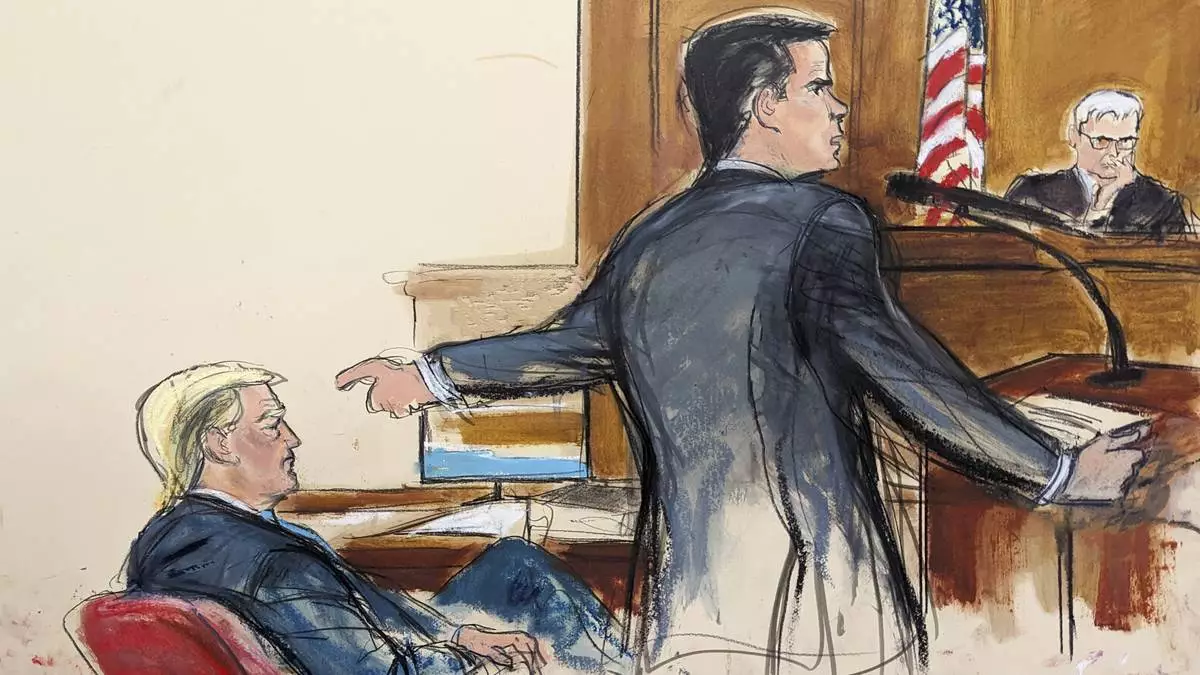
This artist depiction shows defense attorney Todd Blanche pointing at former President Donald Trump while giving his opening statement to the jury in Manhattan criminal court Monday, April 22, 2024, in New York. (Elizabeth Williams via AP)
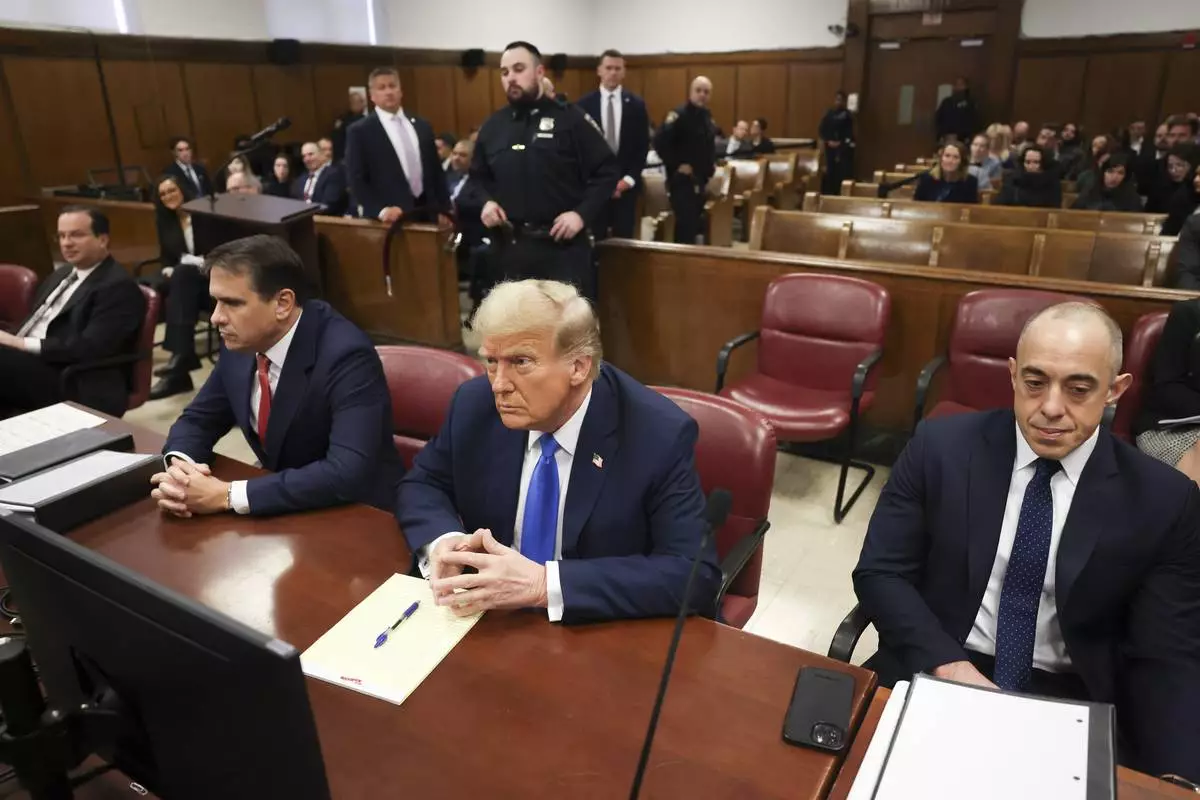
Former president Donald Trump, center, awaits the start of proceedings at Manhattan criminal court, Monday, April 22, 2024, in New York. Opening statements in Donald Trump's historic hush money trial are set to begin. Trump is accused of falsifying internal business records as part of an alleged scheme to bury stories he thought might hurt his presidential campaign in 2016. (AP Photo/Yuki Iwamura, Pool)











